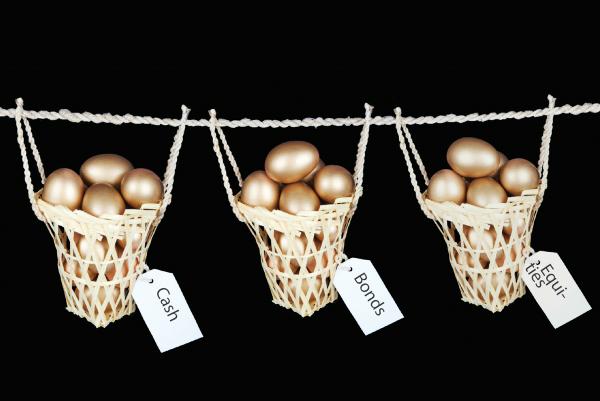With interest rates on cash deposits at such low levels, investors should attempt to hold a diversified portfolio of financial assets in order to provide returns. This diversification should not only be across traditional areas like cash, equities and bonds, but also geographically, so that returns are not solely linked to the fortunes of Ireland.
Central banks have maintained exceptionally low interest rates since the financial crisis to try to spur economic recovery. As a result, the return on cash deposits offered by banks provides little in the way of returns for investors. We expect that this environment is likely to continue in Europe for some time to come, as growth in the Eurozone lags behind that of Britain and US. In light of this, where appropriate, it is important for investors to look for other avenues to provide returns on their savings, while being sure to take on only appropriate levels of risk.
Investing in a diversified portfolio of not only cash, but equities and bonds, could provide opportunities for growth in savings, which would not be possible with only cash deposits.
While Irish household names such as Bank of Ireland, Ryanair, FBD and Glanbia are attractive currently, and worth consideration for a portfolio, it is important to also look beyond Ireland, so that the investor is not over-exposed to one equity index.
Large, international companies that pay sizable dividends, and are involved in stable industries, provide one method of overcoming low rates on deposits. Companies such as Verizon Communications in the US, Allianz Insurance in Germany and Royal Dutch Shell in Britain provide exposure to different aspects of the global economy, and at current prices, offer dividend returns of roughly 4.5% each. In addition, these companies boast a strong underlying business in our view, allowing for the potential of capital gains in addition to dividends.
The Irish investor could further benefit from favourable currency moves by investing in companies whose shares are priced in US dollars or pounds sterling. We expect that the strength of economic recovery in Britain and the US relative to that in Europe will lead to favourable moves in the euro for those investing in assets priced in the other two currencies.
Other potential opportunities lie in tax-relief investments known as Employment and Investment Incentive Schemes (EIIS). These are investments in qualifying unquoted Irish companies, which are providing sufficient employment within Ireland, or meeting research and development spending requirements. Alternatively, investors could consider including Government and corporate bonds in a prospective portfolio. Although providing lower returns, high quality bonds would be less risky than equities.
Clearly, there is a wide variety of potential opportunities for diversification. The most important consideration for the investor is to ensure that they are not overly reliant on the performance of one industry, or economy; in short, that all eggs are not in one basket. Each individual’s financial situation and investment objectives are unique, and as such, consultation with a qualified financial adviser is essential to ensure that any opportunity meets the risk profile, financial situation and objectives of any specific investor.
*David Donnelly is an investment analyst with Cantor Fitzgerald Ireland. He has experience investing in a multitude of assets including equities, commodities, currencies and derivatives, and holds an MBS in Finance from the Smurfit School of Business, UCD. This article is for information purposes only and has been prepared without regard to the individual financial circumstances and objectives of persons who may read it.






 This is a subscriber-only article
This is a subscriber-only article










SHARING OPTIONS: